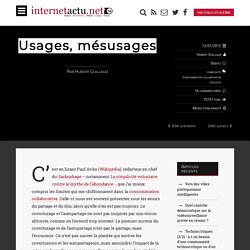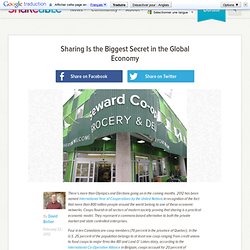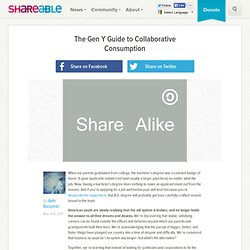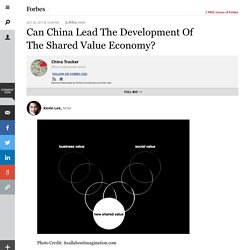

Usages, mésusages. C’est en lisant Paul Ariès (Wikipédia), rédacteur en chef du Sarkophage – notamment La simplicité volontaire contre le mythe de l’abondance -, que j’ai mieux compris les limites qui me chiffonnaient dans la consommation collaborative.

Celle-ci nous est souvent présentée sous les atours du partage et du don, alors qu’elle n’en est pas toujours. Le covoiturage et l’autopartage ne sont pas inspirés par une vision altruiste, comme on l’entend trop souvent. Commons Law Project. For most of 2011, I have been collaborating with Professor Burns H.

Weston of the University of Iowa Law School in writing a major research essay on commons law and human rights. We recently completed a first draft of a lengthy treatise, "Regenerating the Human Right to a Clean and Healthy Environment in the Commons Renaissance. " News and perspectives on the commons. Sharing is the Biggest Secret in the Global Economy. There’s more than Olympics and Elections going on in the coming months. 2012 has been named International Year of Cooperatives by the United Nations in recognition of the fact that more than 800 million people around the world belong to one of these economic networks.

Coops flourish in all sectors of modern society proving that sharing is a practical economic model. They represent a commons-based alternative to both the private market and state controlled enterprises. Four in ten Canadians are coop members (70 percent in the province of Quebec). Around the world, coops provide 100 million jobs, 20 percent more than multinational companies. Differentiating The Anarchy Economy From The Sharing Economy. So which does your household participate in: the Anarchy economy, the Sharing economy, or both?

I'm not a big fan of the word Anarchy. It implies chaos and conjures images of masked mobs, smoke grenades, and police beat downs. But if our global financial system isn't in a state of chaos, just what state is it in then? I have been involved with the Sharing Economy and Collaborative Consumption movement full time since 2006. That is the year I helped research and co-author the first municipal response plan for dealing with the effects of collapsing currencies and resource scarcity. Legit. L'autonomie est-elle l'avenir de notre société? Chaque homme doit inventer son chemin... mais est-ce véritablement le cas dans nos sociétés modernes?

Perdu dans ses finances incontrôlables, ses productions mondialisées et ses entreprises où l'humain et la nature ne pèsent pas bien lourds, le capitalisme d'aujourd'hui semble s'être laissé piéger par sa complexité et son obsession du profit. Et nous, citoyens-consommateurs, courons chaque jour derrière la consommation, l'épargne, le travail, la sécu, la retraite... Est-ce vraiment la bonne réponse à notre quête personnelle de sens et de bien-être? Est-ce la bonne voie pour pérenniser notre économie et réinventer l'imaginaire de notre avenir collectif? Une solution est en marche qui pourrait résoudre une partie de nos difficultés: l'autonomie. Le royaume des "créateurs-fabricants" Collaborative Fund. Spinlister: Peer-To-Peer Bike Sharing Gets Rolling. If you’ve been hiding from the Internet for the last five years, you can be forgiven for not knowing about the collaborative consumption economy.

The Gen Y Guide to Collaborative Consumption. When our parents graduated from college, the bachelor’s degree was a coveted badge of honor.

It gave applicants instant cred (and usually a larger paycheck) no matter what the job. Now, having a bachelor’s degree does nothing to make an applicant stand out from the masses. And if you’re applying for a job well below your skill level because you’re desperate for a paycheck, that B.S. degree will probably get your carefully crafted resume tossed in the trash. American youth are slowly realizing that the old system is broken, and no longer holds the answer to all their dreams and desires. We’re discovering that stable, satisfying careers can be found outside the offices and factories around which our parents and grandparents built their lives. Together, we’re learning that instead of waiting for politicians and corporations to fix the system, it’s possible to create a better one of our own, right under their noses.
HBR-Shared-Value-Creation.png (642×844) Can China Lead The Development Of The Shared Value Economy? Photo Credit: itsallaboutimagination.com In the past year, I’ve met with scores of new people and talked about how the research and consulting company I help lead, China Youthology, had launched a non-profit platform to directly engage youth called Open Youthology.

The most common response I get is, “Are you an NGO?” It puzzled me why so many people couldn’t see the logic: Investing directly in what’s good for the community will secure what’s good for business. I also felt a little anxious; why were we the only ones doing this? Are we totally wrong? Then, in January 2011, validation came. The concept of Shared Value recognizes that societal needs, not just conventional economic needs, define markets. The article laid out paragraph by paragraph, with numerous supporting case examples, everything my partners and I believed and are trying to build at China Youthology.